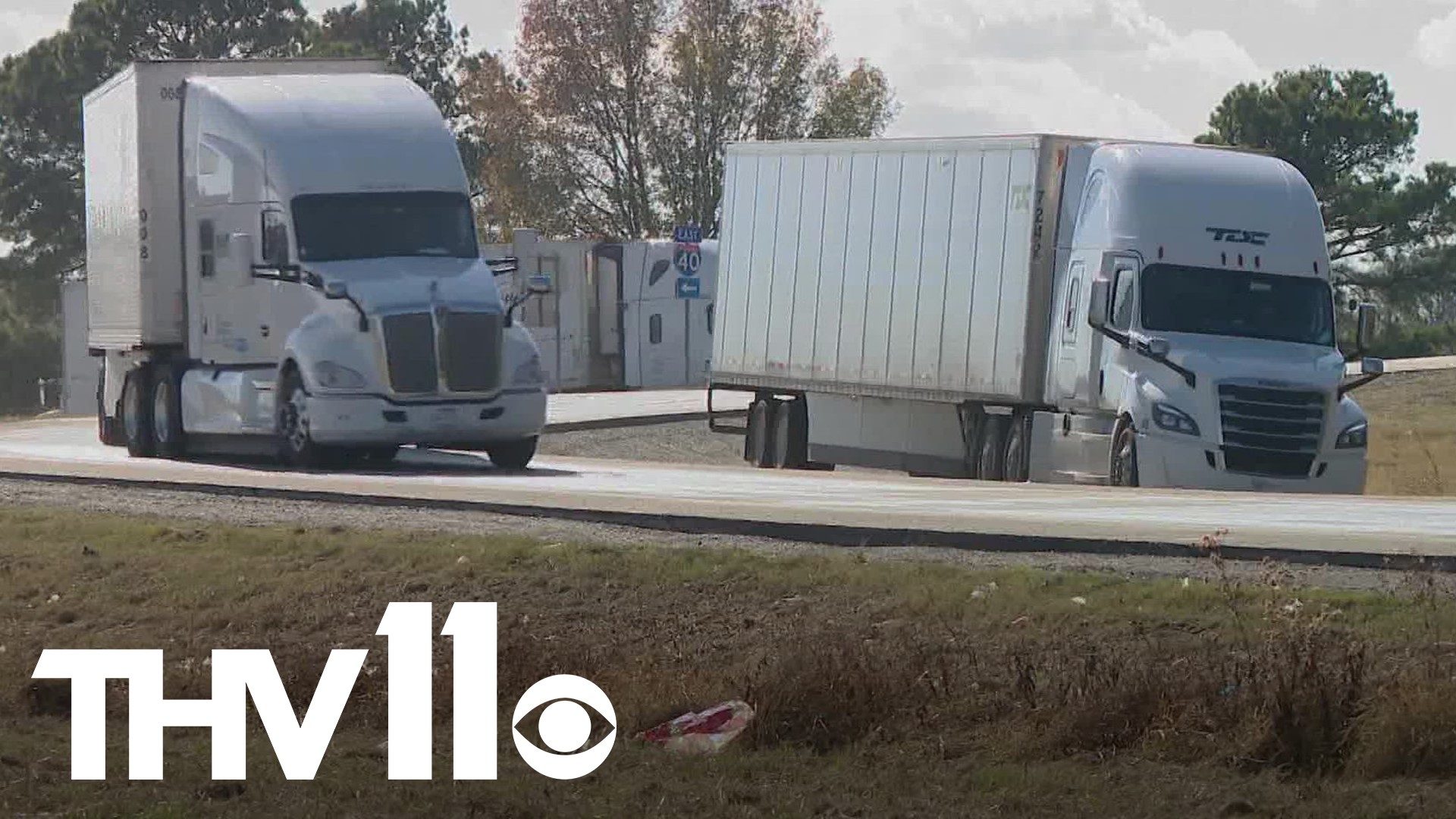CADDO VALLEY, Ark. — The trucking industry is one of the largest employers in Arkansas and plays an outsized role in keeping the economy moving, but there's a problem building centered on when all those trucks have to stop.
"Truck parking at night here in the city is huge," said Aaron Collier, chief of the Caddo Valley Police Department, a tiny town bisected by I-30 facing a big problem with big rigs.
"They get off there all the time and they park from the highway all the way to where to where you get off and enter onto the off ramp," he said pointing to ramps at the exit 78 interchange. "I'd say it's it's a very big problem right now."
Collier's very big problem impacts all of us in two very big ways: shipping costs and safety.
When we see trucks lining off ramps and filling rest areas, we might want to blame truckers for being big road hogs, but it's not the same as when your neighbors hog up all the spaces on your street.
There are reasons they're under pressure to park.
Trucking industry experts say that despite a shortage of 80,000 drivers last year, there is only one overnight parking spot for every dozen trucks that is on the road. It's a major complication for an industry often called "logistics."
"You want the drivers to be safe and you want them to be able to get rest in a safe place so that they're alert and awake while they're responsible for operating their equipment on the roads," said Shannon Newton, the president of the Arkansas Trucking Association.
"The number one issue identified by drivers was truck parking," she said, referring to a recent survey. "It is the number one thing on their minds impacting their day to day lives."
"When I was running as an independent contractor it affected me a lot," said Tom Saunders, a 40-year veteran behind the wheel based in Bryan, Texas. "A lot of times it was the difference between getting another load either on or off your trailer."
Both Saunders and Newton point to a new system designed to make roads safer for everyone has made the job tougher. Since 2019, electronic logging devices are required in cabs to keep track of how long and how far a truck has gone.
Truckers can't fudge paper work anymore.
With strict limits on when a driver has to shut down, a nightly heavy metal game of musical chairs develops with truckers trying to find a spot before the music stops and that device starts to beep.
Especially in places like North Little Rock.
"It gets full even when you pull through there 10, 11 o'clock at night," Saunders said. "You're not gonna find a spot."
"Truck drivers are actually coming off the road before they're out of hours to secure that parking spot," said Newton.
For most of us, that's the same as leaving work early to get the only space in your driveway. For truckers it means money is left on the table.
And for most of us, it means packages and shipments get bogged down while drivers forego time on the clock just to find a safe parking spot, driving up the cost of shipping and, eventually, the cost of everything.
It gets worse for the drivers who couldn't get the timing right on their trip.
"That [logging device] starts beeping that they're gonna run out of time and they got nowhere to go," said Saunders. "All they can do is pull on off ramp and hope they don't get ticketed."
"They just got to pull over at that instant wherever they get to," said Chief Collier. "Half the time it feels like it's Caddo Valley, or one of the on and off ramps."
That prompts Collier and his colleagues to bang on the doors of a line of cabs. Often the drivers are asleep, or they may have left the truck to go find someplace to eat.
When daylight comes, Collier said the trucks leave behind a mess.
"The city pays hundreds of dollars every month to pick up littered trash, sacks of human feces, bottles of urine," he said.
Newton called this a capacity issue, so the obvious solution is to pave a paradise like this and put up a parking lot.
More specially designed parking and rest areas like one just south of Conway on I-40 build capacity, but like everything, building rest areas has gotten more expensive.
"A new project that's going in in West Memphis, where we've actually broken ground and secured funding for that specific project, that's an $8 million project," said Newton, who added that we probably need two or three similar parking projects in the state.
Newton said the industry has convinced the federal government already and that grant money is on the way to help pay for the first one, at least.
That's not too soon for Chief Collier, so it could get him get out of the business of rousting tired truckers.
"In my opinion, it'd be great," he said. "It helped us to keep them off the ramps and keep them from parking on the highway and the road and it would help them so they'd have a place to sleep at night and like to drive safely the next day when they get up."

